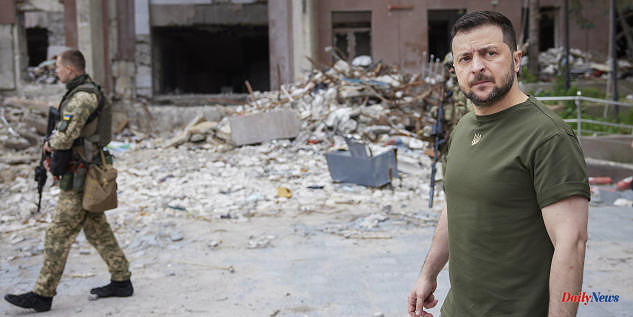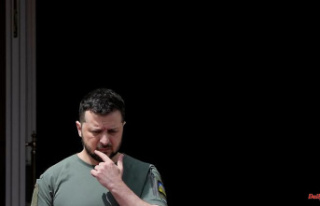From the south, Volodymyr Zelensky, Ukrainian President, assures Sunday, June 19, that his troops are strong and will win against the Russians in a conflict that could last years, according to NATO.
Zelensky made a rare trip to Kyiv, the place he had barricaded himself in at the beginning of the conflict, when the capital was under threat from the Russian army. He visited troops stationed nearby as well as the Odessa region. He said, "We won’t give the South away to anyone, but we’ll take everything back. And the sea will remain Ukrainian, it will always be safe," in a Telegram video he posted as he returned from Kyev.
NATO Secretary General Jens Sloltenberg gave a more dire assessment of the situation. In a Sunday interview by "Bild", he said that war could continue for "years" and urged Western countries to support kyiv long-term.
He stated that "we must not let up in supporting Ukraine, even if the costs are high not only in terms military support, but also because of rising energy prices and food prices." says Jens Stoltenberg.
Since their February 24 lightning attack, when they failed to seize the capital kyiv, Russian forces have been focusing their firepower on southern and eastern Ukraine. "The losses are substantial. Volodymyr Zelensky stated that many houses were destroyed, civil logistics disrupted and there were numerous social problems. He added:
Volodymyr Zelensky thanked soldiers for their "heroic services", which included the thrust of Russian troops. It is vital that you live. He told them that as long as you're alive, there will be a strong Ukrainian wall to protect our country."
The presidency released a video of him in Mykolaiv, with Vitaliy Kim, the local governor. It was taken in front of Vitaliy's headquarters, which was damaged by a Russian strike in March, which resulted in 37 deaths.
The port and industrial city, which was home to almost half a millennium of pre-war residents, is still under Ukrainian control. However, it is located close to the Kherson region. It is almost entirely occupied now by the Russians. Two people were killed and 20 others were injured in a Russian strike on Friday.
Moscow continues to target it because it lies on the road to Odessa (Ukraine's largest port), 130km to the southwest of Moldova. It is also under Ukrainian control.
Russia, which holds this region of the Black Sea, despite firing missiles at its ships from Ukraine, explained that the waters were mined.
On Saturday, thousands gathered in Kiev to pay respect to Roman Ratushny (24), a pro-European Maidan figure in Ukraine who was killed fighting the Russians in eastern Ukraine.
People of all ages gathered to pay respects to his coffin, which was draped in a yellow-and-blue Ukrainian flag and placed at the base of a monument overlooking the city's sprawling Independence Square. Dmytro Ostrovsky (17-year-old highschool student) said that he believed it was important to be there in his memory. As the violence continues, this loss gives a human face to the pain felt by Ukrainians.
Fierce fighting is raging near Severodonetsk in the Donbass (east), which has been partially controlled since 2014 by pro-Russian separatists. Russia, having failed to take kyiv within the first weeks of its offensive in 2014, now wants to take complete control.
Sergii Gaidai (guvernor of the Lugansk Region, home to the cities Severodonetsk & Lysychansk) said that "there is an expression that states: you must prepare for the worst, and the best will happen by itself." He spoke to AFP in an interview on Saturday. . "Officially we must prepare," said the man, who warned repeatedly that Russia would surround Lysytchansk and cut off its main supply lines. He said that the situation was difficult in Lysychansk and throughout the region, as the Russians were "attacking our positions 24 hours a day".
Lysychansk residents were ready to evacuate: "We are giving everything up and moving on." Alla Bor, a resident and history teacher said that no one could survive such a strike. Sergey Gaidai, a Russian journalist, had earlier reported that Azot, a chemical plant in Severodonetsk was under siege, suffered "more damage." More than 500 civilians, 38 of them children, were hiding in the Azot compound.
Pro-Russian authorities in Donetsk (capital of the self-proclaimed "republic", in the Donbass region that has escaped Kyiv since 2014), stated that Ukrainian shelling had left the city with five dead and twelve injured. The civilian population.
The Ukrainians are again afraid of an offensive in the north, which is from Belarus, where the Russian forces attacked.
General Volodymyr Karpenko was the chief of logistics for the Ukrainian army and admitted in an interview that Ukraine had lost "about half" of its armaments. .
The Ukrainian delegation's head David Arakhamia told the Ukrainian voice of America that only after the Russian forces are defeated will Ukraine be ready for new negotiations with Moscow. . "A bare bones deal (for negotiations, N.D.L.R.) He said that it would depend on whether we push them back, or if they are willing to return to the positions they held before February 24, 2004.












